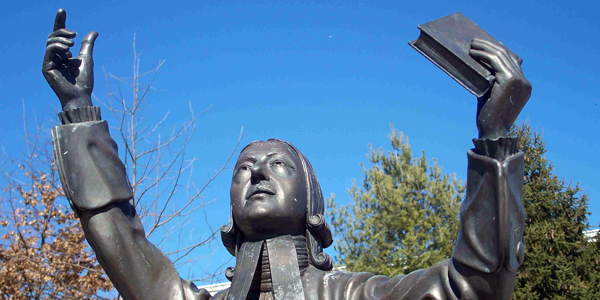
Dear Friends,
I am excited to share with you that I have entered a new phase of life and ministry. I am now officially an onine Doctor of Ministry student at Asbury Theological Seminary in the Activating Missional Communities program, while still serving as pastor at Hope. This new journey means a lot of things, not the least of which, is that my Kindle and I are becoming close and personal friends.
As individuals hear about my taking this step the first question is often, “Why?” While the answer is somewhat complex I wanted to take a moment to share with you some of my thoughts, largely taken from my program application.
The purpose of studying, at this time in my ministry, is about increased potential and opportunity. As a leader, as I grow the church grows. Maybe not necessarily numerically but certainly in ways that matter. From my perspective, working toward a D. Min. is a unique opportunity to learn and grow from some of the greatest leaders in the church and bring their wisdom into our particular situation at Hope. Studying in this type of program is also an opportunity for me to exponentially increase my knowledge in ways not so easily done through self-study.
One particular area of leadership growth and development I am particularly interested in is the area of discipleship. When I was in seminary Dr. David Holdren, who was then a General Superintendent, spoke with the Wesleyan students. On a white board, he drew out for us a system of discipleship he had just learned about that used a baseball diamond. As he described this baseball-based model, he said that all of us needed to develop a model of discipleship. At the time, I did not fully understand his advice, but I have always remembered those words of counsel.
Years later I read the book Home Run Life by Kevin Myers and realized this was the model Dr. Holdren was showing to us. I have also read other books explaining a particular pastor’s model for discipleship. I have been struck by the realization, if you boil them all down, they are really all about the same. This realization regarding each of these models brought me back to the words of advice from Dr. Holdren when I was in seminary.
I feel one of the greatest challenges for the church is in the area of discipleship. Our current answer to the question of whether we are effectively developing wholly devoted followers of Christ is a poor one. As I have been processing this reality, I have been working to formulate an effective system for our particular context. Much work remains, but I believe such a system:
- needs to be self-assessing. The church no longer has the authority, if it ever did, to say to a person you are a spiritual infant (even though you have been in the church for 40 years).
- while self-assessing, must naturally lead people to movement and growth. There is no condemnation for where a person is at. What is important is not where a person is at. What is important is that they are moving.
- must take into account the realities of church membership/attendance. A “committed” church member may realistically only attend 50-75% of the time.
- must take into account, even if a person attends 100% of the time, Sunday morning is not enough.
- must go to where people are at. Church attendance is not a natural choice for the spiritual “nones.” John Wesley would go in the early morning hours and stand on the coal piles outside the coal mines and preach to the miners before they would go down into the mines each day. Where are the coal piles today? Every day people walk into darkness. How do we give them light to take with them, even if they are not followers of Jesus?
- must make use of, build on, and find fresh expressions of the disciplines and traditions of the past 2,000 years of Christendom.
- must make room for the Spirit to work in people’s lives on the Spirit’s timeline.
- must be Kingdom centered. God is not a respecter of people, cultures or nations.
- must be full of grace and truth.
- must challenge people to, as Richard Stearns says, to “go nuclear.” In generations past missionaries would load their belongings into a coffin knowing they were never coming home. Today hundreds of thousands of people applied to be the first humans to travel to Mars, knowing it will be a one-way journey. Are we calling and challenging people to do great things for God, even things as crazy as traveling to Mars?
- must scale up and scale down. Will it guide people as effectively in their spiritual growth in a church of two as a church of 100,000?
- must empower others to lead and reproduce.
In the process of implementing such a system, we have many amazing resources available to us today to help us connect with each other and grow together. These include, but are certainly not limited to podcasting, webinars, blogging, and various social media platforms.
Along this journey I will be sharing in this blog insights I am learning and questions I am pondering. I encourage you to interact and share your thoughts. Some of the things I may share may be controversial or push some buttons. I don’t promise to even completely agree with everything I post. This will be a learning opportunity for all of us to be stretched and grow and I welcome the chance to process these concepts with all of you. I know that I have much to learn.
Blessings,
Stephen